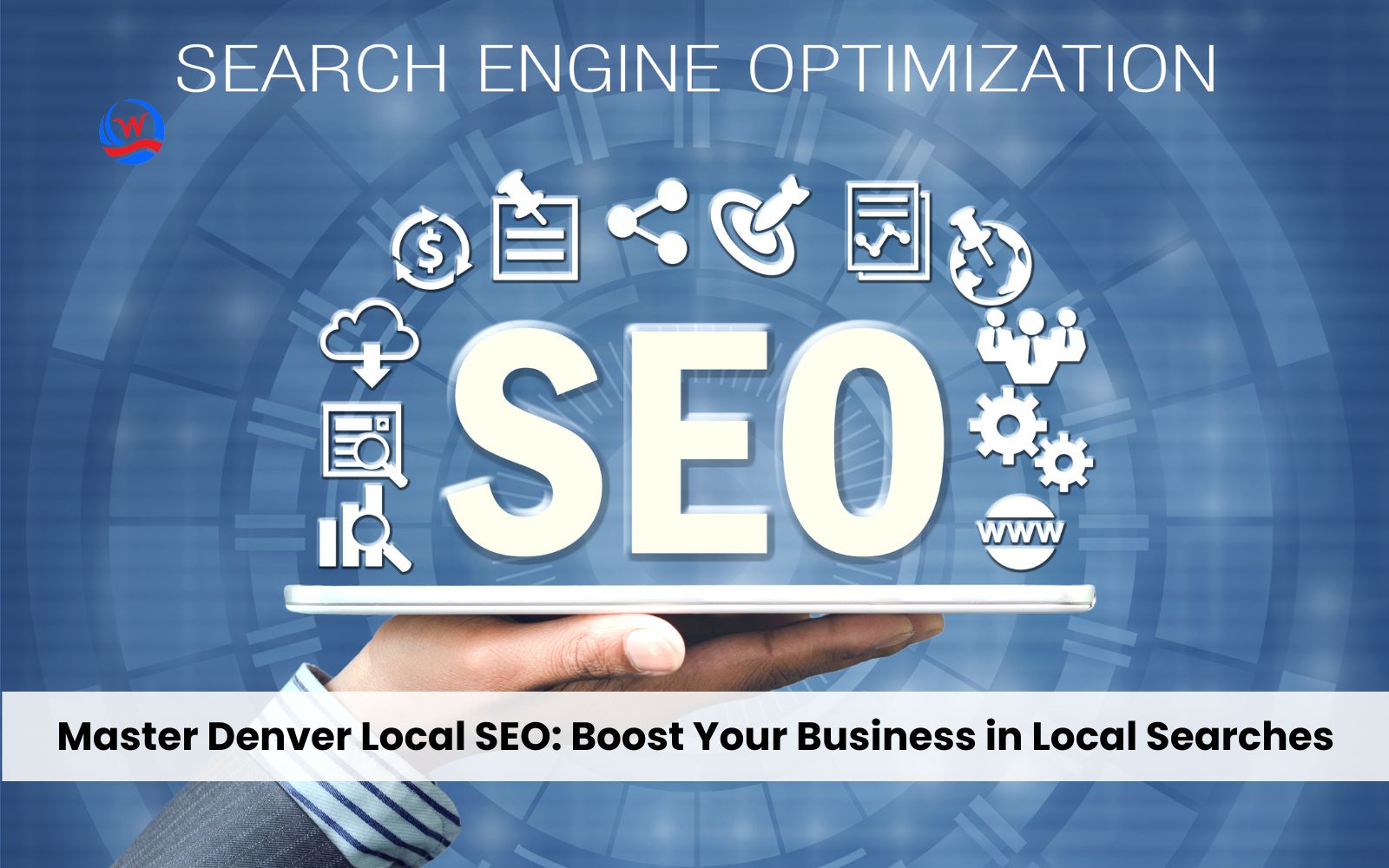As local search becomes the heartbeat of business growth, Denver local SEO is now the game-changer for companies in the Mile High City’s digital marketplace. Local SEO is the missing link between your business and customers ready to buy right now.
But what is local SEO? Think of it as the art – and science – of optimizing your online presence so people can find you at the top of Google. In short, local SEO helps you appear where it matters most: local searches, Google Maps, and that all-important 3-pack of map results at the top of the page.
In this ultimate guide, you’ll discover why local digital market is unique, how smart local SEO can skyrocket your revenue, and specific strategies tailored for small businesses, service-area companies, franchises, and solo entrepreneurs.
What is Denver Local SEO and Why It Matters in 2025
The Fundamentals of Local SEO
Local SEO is a targeted strategy focused on maximizing your business’s visibility in geographically-related searches.
It’s different from classic SEO because it prioritizes location-based keywords, Google Business Profile optimization (formerly Google My Business or GMB), and placement on map packs.
Here’s the difference: over 89% of Denver residents use Google to find local businesses, and more than 50% act on these searches within 24 hours.
If you’re not ranking for Denver “near me” queries or local neighborhoods (Capitol Hill, Highlands, etc.), you’re invisible to the majority of your potential customers.
Why Generic SEO Isn’t Enough
Business ecosystem is uniquely challenging. With rapid population growth and an entrepreneurial spirit, the Mile High City has seen a surge in business competition across virtually every sector. Generic SEO approaches simply don’t account for:
- Denver’s neighborhood-specific search patterns (searches for “Cherry Creek restaurants” vs. “LoDo coffee shops”)
- The city’s tech-savvy, mobile-first consumer base
- Denver’s distinct seasonal business trends
- The importance of neighborhood identity in consumer decision-making
Our research shows that Denver consumers are 34% more likely to include neighborhood names in their searches compared to the national average. Understanding these nuances is crucial for local SEO success.

Key Benefits of Local SEO for Denver Businesses
Increased Visibility in Google’s Local Pack and Maps
One of the most valuable benefits of Denver local SEO is gaining visibility in Google’s Local Pack and Google Maps. These prominent positions drive significant foot traffic to local businesses.
With over 84% of Denver consumers conducting searches on mobile devices, appearing in these local results is crucial. When someone searches for “coffee shop near me” or “Denver plumber,” businesses that have optimized their local SEO have a much higher chance of appearing in these coveted positions.
The “near me” search trend is particularly strong , with thousands of these searches happening daily. By implementing proper local SEO strategies, your business can capture this high-intent traffic.
Higher Conversion Rates from Qualified Local Traffic
Local search isn’t just about impressions; it’s the fastest way to more customers. Studies show Denver’s local SEO services outperform traditional ads for conversion – folks searching for nearby services are 80% more likely to buy. Why? Because they’re ready to act, and your info matches their needs right when they want it.
In Denver’s competitive market, businesses implementing targeted local SEO strategies report:
- 23% higher conversion rates compared to traditional advertising
- 38% lower cost per acquisition
- 42% increase in store visits from mobile searches
The data is clear: Denver businesses focusing on local SEO are capturing more qualified leads that convert into actual customers.
Building Trust Through Local Presence
Denverites are loyal to businesses they can trust – especially when they see consistent info, recent reviews, and participation in local events (think: Denver Business Journal mentions, or partnerships with the Denver Chamber of Commerce).
With robust review management and quality local business citations, you don’t just rank… you build a brand that feels like part of the community.
Leverage positive Google reviews, share photos that highlight landmarks, and create locally relevant blog content – watch those conversions climb!
Common Challenges in Denver Local SEO
While the opportunities are massive, the road to top-tier local search rankings isn’t always smooth.
Here’s where many Mile High businesses get stuck – and how to sidestep the pitfalls.
Intense Local Competition
Denver’s business climate is booming, making standing out in crowded map packs results tough – especially in industries like healthcare, wellness, or hospitality.
Winning requires ongoing local citation building, quality backlinks from local directories, and consistent business profile management.
Keyword Optimization Pitfalls
Many companies make the mistake of picking generic keywords or forgetting to use phrases and neighborhood-specific SEO services.
This leads to wasted content that never reaches your true target market – think “best dentist” instead of “best dentist Glendale Denver.”
Managing Multiple Locations
If your business spans different areas – say, both Capitol Hill and Sloan’s Lake – getting each to rank for relevant “near me” queries is complex.
You need separate location pages, consistent Denver NAP consistency (name, address, phone), and local schema markup for each spot. Otherwise, Google may show the wrong address, or worse, not show you at all!

Essential Denver Local SEO Strategies for 2025
Google Business Profile Optimization
Your Google Business Profile (formerly Google My Business) serves as the foundation of your local SEO strategy. A complete, accurate, and engaging profile directly impacts your visibility in local searches and Google Maps.
Start by ensuring your business name, address, phone number, website, and hours are 100% accurate. For Denver businesses, it’s essential to select the most relevant primary and secondary categories that precisely match your services.
For example, rather than just “Restaurant,” specify “Italian Restaurant” if that better represents your business.
Denver consumers respond particularly well to visual content. Businesses with 30+ high-quality photos on their profiles receive 42% more requests for directions and 35% more website clicks than those with few or low-quality images.
Include geo-tagged photos of your interior, exterior (showing neighborhood context), products/services, team members, and any elements that highlight your local connection.
Denver-Focused Keyword Research and Implementation
Use long-tail and hyperlocal keywords like “best local SEO services for small businesses in Denver” and “Denver Google My Business optimization.”
Tools can help with local keyword research for businesses, but don’t overlook the power of exploring what your competitors in Denver are ranking for in your precise industry!
- Use combinations like [Service] + [Denver Neighborhood]; e.g., “detox center LoDo”
- Integrate “near me,” “in Denver,” and neighborhood names
- Ensure content matches top searcher intent in your Denver market
Don’t overlook long-tail local keywords with high conversion potential. Terms like “best organic coffee shop in LoDo Denver” or “affordable family photographer South Denver” may have lower search volume but typically convert at much higher rates because they indicate specific intent.
Building Quality Local Citations and Backlinks
Local citations – mentions of your business name, address, and phone number (NAP) on other websites – play a crucial role in Denver local SEO.
Start by ensuring your business is listed on business directories like the Denver Chamber of Commerce, Denver Small Business Association, and Denver Business Journal.
NAP consistency is vital – ensure your business information appears exactly the same way across all platforms. Even small differences (like “Street” vs. “St.”) can confuse search engines and diminish your local SEO effectiveness.
Developing partnerships with other local businesses, community organizations, and industry associations provides valuable opportunities for authentic local backlinks. These relevant local links carry significantly more weight for local SEO than generic backlinks from unrelated sources.

Advanced Local SEO Tactics for Competitive Denver Industries
Location Page Optimization
For businesses serving multiple Denver neighborhoods, creating dedicated location pages is essential for local SEO success. Each page should contain unique, valuable content specific to that neighborhood rather than duplicated information with only the location name changed.
Incorporate neighborhood-specific details like local landmarks, community features, or area-specific services to make each page genuinely relevant to local searchers.
For example, a home cleaning service might mention specific housing types common in different neighborhoods or neighborhood-specific cleaning challenges.
To avoid duplicate content issues, ensure each location page has a distinct focus, unique testimonials from local customers, neighborhood-specific offers, and relevant local keywords naturally integrated throughout the content.
Local Schema Markup Implementation
Schema markup – a form of structured data that helps search engines understand your content – provides a significant advantage for local businesses.
Implement LocalBusiness schema that includes your Denver address, phone number, business hours, services, and accepted payment methods. For businesses with multiple locations, use Organization schema with nested LocalBusiness entities for each location.
Event schema can boost visibility for businesses that host workshops, sales events, or community gatherings. Review schema helps highlight your positive customer feedback directly in search results, building trust before prospects even visit your website.
Mobile Optimization for Denver’s On-the-Go Consumers
Denver residents have one of the highest mobile usage rates in the country, making mobile optimization critical for local SEO success.
- Page speed is particularly important – 46% of Denver consumers will abandon a page that takes more than 3 seconds to load on mobile devices.
- Develop mobile-first, location-focused content that addresses the needs of customers searching while on the move.
- Clear calls-to-action, tap-to-call functionality, and prominent directions are essential features.
- Voice search optimization is increasingly important as more consumers use voice assistants to find local businesses.
- Optimize for conversational queries by incorporating natural language phrases and questions into your content that match how people actually speak when searching for local businesses.
Measuring Success: Local SEO Metrics for Denver Businesses
Key Performance Indicators for Local Search
Track these essential metrics to gauge your Denver local SEO success:
- Local pack ranking positions – Are you appearing in the top 3 for key neighborhood searches?
- Google Business Profile insights – Views, clicks, calls, and direction requests
- Website traffic from local searches – Both quantity and quality of visitors
- Conversion rates from local traffic – Are local visitors becoming customers?
- Review quantity and quality – Volume, star rating, and sentiment of customer feedback
These indicators provide a comprehensive view of your Denver local SEO performance.
Tools and Resources for Monitoring Local SEO Performance
Several tools can help track your Denver local SEO progress:
- Google Business Profile Insights – Free data directly from Google
- Local rank tracking tools – BrightLocal, Moz Local, Semrush
- Review monitoring solutions – Reputation.com, BirdEye, ReviewTrackers
- Google Analytics with geo-targeting – Track visitor behavior by location
Combining these resources provides a 360-degree view of your local search performance.
Setting Realistic Timelines and Expectations
Denver local SEO success doesn’t happen overnight:
- Competitive analysis matters – Rankings in Cherry Creek may take longer than in less competitive neighborhoods
- Typical timeframes – Expect 3-6 months for significant improvements in moderately competitive industries
- Budget considerations – Investments vary based on competition, current status, and goals
Understanding these realities helps set appropriate expectations for your local SEO journey.

Taking Action: Next Steps for Your Denver Business
Conducting a Local SEO Audit
Start your local SEO journey with a comprehensive audit to identify strengths, weaknesses, and opportunities. Evaluate your current Google Business Profile completeness, review profile, citation consistency, website optimization for local search, and competitive positioning.
Common issues to identify include inconsistent NAP information, incomplete Google Business Profile, limited or negative reviews, missing local content, poor mobile experience, and technical SEO problems that impact local rankings.
Prioritize improvements based on potential impact and implementation difficulty. Quick wins like completing your Google Business Profile or correcting citation inconsistencies often provide the fastest results while you develop longer-term strategies.
DIY vs. Professional Denver Local SEO Services
Deciding between handling SEO in-house or hiring professionals depends on several factors:
What you can realistically handle in-house:
- Basic Google Business Profile management
- Responding to customer reviews
- Creating simple neighborhood-focused content
When to consider professional help:
- Competitive industries requiring technical expertise
- Managing multiple Denver locations
- Recovering from penalties or negative reviews
- Need for rapid ranking improvements
How to choose a Denver SEO partner:
- Look for demonstrated local success in your industry
- Check their understanding of Denver’s neighborhood dynamics
- Review their approach to measurement and reporting
The right approach depends on your resources, expertise, and competitive landscape.
Building a Sustainable Local SEO Strategy
Local SEO isn’t a one-time project but an ongoing process requiring consistent attention. Establish regular maintenance tasks like updating business information, responding to reviews, creating fresh local content, and monitoring performance metrics.
Stay adaptive to algorithm updates that affect local search. Google makes hundreds of algorithm changes annually, with several major updates that can significantly impact local rankings. Having a flexible strategy allows you to pivot quickly when these changes occur.
As your business grows, scale your local SEO efforts accordingly. This might involve expanding to new neighborhoods, increasing your content development, building more local partnerships, or leveraging customer data to refine your local targeting.
Conclusion
Denver local SEO is essential for businesses hoping to stand out in our city’s competitive digital landscape. By implementing neighborhood-specific strategies, optimizing your Google Business Profile, and maintaining consistent citations, you’ll connect with qualified local customers actively searching for your services.
Success requires ongoing attention – the businesses that adapt to algorithm changes and refine their local approach are the ones that ultimately dominate search results. Whether you serve a single neighborhood or the entire metro area, these strategies provide your roadmap to local search visibility.
Need help with your Denver local SEO? Contact our experts today at (720) 334-0899 or [email protected] for a free consultation.
Frequently Asked Questions (FAQs)
How long does it take for local SEO to work?
For most Denver businesses, expect to see initial improvements within 1-3 months, with significant results typically appearing within 4-6 months. Highly competitive industries or areas may require longer timeframes.
What are the pros of local SEO?
Local SEO connects your Denver business with nearby customers actively searching for your products or services, resulting in higher-quality leads, better conversion rates, and improved ROI compared to traditional advertising.
Which SEO techniques should be avoided?
Avoid keyword stuffing, creating duplicate content across neighborhood pages, buying fake reviews, and using irrelevant backlinks. These tactics violate Google’s guidelines and can result in penalties.
What are the advantages of local search?
Local search delivers geographically relevant results to consumers, connecting them with nearby businesses that match their needs. For businesses, this means higher-quality traffic with stronger purchase intent.
What are the problems faced by a local search algorithm?
Local search algorithms struggle with determining business legitimacy, handling businesses with service areas rather than physical locations, and combating spam listings. Understanding these challenges helps develop more effective optimization strategies.



